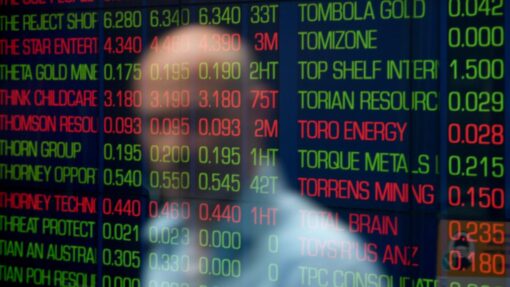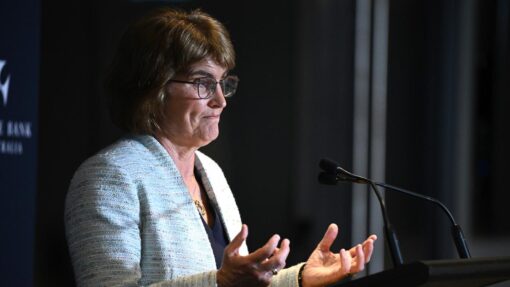Australian stocks drop after two US banks collapse
Derek Rose |
The local share market has closed at a nine-week low as traders wonder whether there’ll be more fallout following the failure of two major banks in the United States.
The benchmark S&P/ASX200 index on Monday finished down 35.9 points, or 0.5 per cent, to 7,108.8, while the broader All Ordinaries dropped 37.2 points, or 0.51 per cent, to 7,311.
In the US, the Federal Reserve, Treasury Department and Federal Deposit Insurance Corporation moved quickly to stem fears the failure of Silicon Valley Bank would ripple through the financial system, announcing shortly before the ASX opened that all depositors would have access to their funds on Monday.
They also shut down another troubled financial institution, New York-based Signature Bank.
Betashares chief economist David Bassanese said US authorities had acted even more forcefully than he expected.
“It’s been a huge step – in the wrong direction with regards to moral hazard but it’s been a great step in terms of limiting near-term contagion,” he told AAP.
“I guess the answer is, whenever they face that trade-off between moral hazard and contagion, they’ll stop the contagion at the risk of creating more moral hazard,” Mr Bassanese said, using an economics term to refer how being shielded from the consequences of risky behaviour can inadvertently encourage even more risk-taking.
It should be clear quickly whether the US regulators have indeed stemmed a financial panic, he said.
“In the next few days, it’s just going to be absolutely critical to see what extent there are other bank concerns.”
If there is no contagion then the Fed might return its focus to inflation, perhaps raising interest rates next week again by only 25 basis points rather than 50, Mr Bassanese said. “A little bit of extra caution.”
If more issues emerge with other banks, the Fed might not raise rates at all this month and possibly the Reserve Bank would follow in April, he indicated.
That would be great news for bond markets but a mixed bag for equities, as concerns about the contagion and a collapse in credit might more than offset the benefits of a rate-hike pause.
Every ASX sector except energy and materials was lower on Monday, with financials the biggest losers, falling 1.4 per cent.
ANZ dropped 1.9 per cent to a two-and-a-half-month low of $23.39, Westpac retreated 1.4 per cent to $21.49, NAB declined 1.6 per cent to $28.54 and CBA dipped 0.4 per cent to $95.12.
Macquarie declined 1.4 per cent to $182.13 and IAG, Suncorp and QBE all fell more than two per cent.
In the tech sector there was a steady stream of announcements from companies about their exposure or lack thereof to Silicon Valley Bank.
San Francisco-based family tracking app platform Life360, which banked with SVB, had to make alternative arrangements over the weekend to ensure it could make payroll on Wednesday, although those plans became moot once the bailout was announced.
It was also a “difficult few days navigating implications” for ikeGPS Group, a New Zealand-based utility pole measurement company that had $US3.2 million deposited with SVB.
In the heavyweight mining sector, BHP climbed 1.8 per cent to $45.83, Rio Tinto added 1.0 per cent to $118.46 and Fortescue finished up 1.2 per cent to $21.76.
Goldminers did well as the price of the safe haven metal jumped to a six-week high of $US1,878 an ounce amid the uncertainty.
Newcrest gained 2.9 per cent and Northern Star added 5.0 per cent, with Evolution rising 1.1 per cent even as it announced it would have to stop operations at its Ernest Henry copper mine in Queensland for an estimated six weeks because water from recent heavy rains had entered the mine workings.
Neuren Pharmaceuticals has soared 18.5 per cent to a 15-year high of $9.09 after North American partner Acadia Pharmaceuticals received US Food and Drug Administration approval for a treatment for Rett syndrome, a rare genetic disorder mostly affecting girls.
Acadia has licensed the drug for use in North America and Neuren stands to make millions in royalties from the treatment, which is not a cure but helps with symptoms.
The Australian dollar was buying 66.61 US cents, from 65.94 US cents at Friday’s ASX close.
ON THE ASX:
* The benchmark S&P/ASX200 index finished Monday down 35.9 points, or 0.5 per cent, at 7,108.8.
* The broader All Ordinaries dropped 37.2 points, or 0.51 per cent, to 7,311.
CURRENCY SNAPSHOT:
One Australian dollar buys:
* 66.61 US cents, from 65.94 US cents at Friday’s ASX close
* 89.50 Japanese yen, from 90.02 Japanese yen
* 62.12 Euro cents, from 62.24 Euro cents
* 55.00 British pence, from 55.26 pence
* 107.72 NZ cents, from 108.01 NZ cents.
AAP


